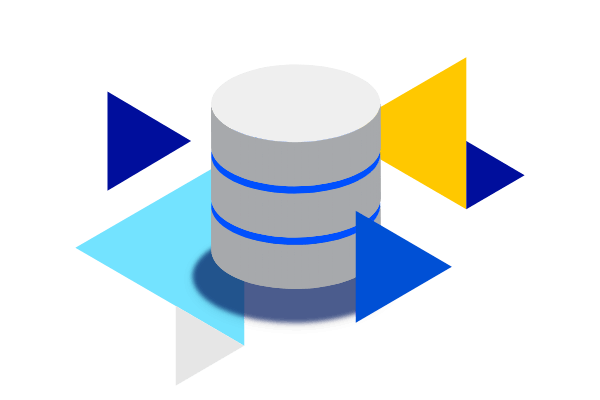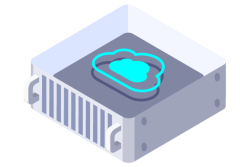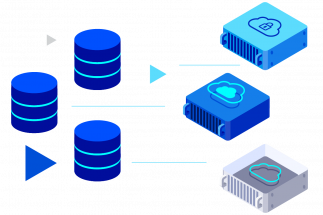
Gain a competitive edge, with our managed databases
Harness the power of your data while keeping sole control over your assets. With our managed database services, we take care of the database infrastructure and administration, including set-up, backup, scalability and security. This saves you time and money, so you and your team can focus on building and deploying cloud-based applications. Choose from a large portfolio of popular engines within the Public Cloud, and deploy your Public Cloud Database, today.
Available Engines

Deploy MySQL, the most popular open-source relational database, as a managed service in just a few clicks.

With the PostgreSQL database service, you can create your business applications and migrate your old workloads to the cloud with total confidence.

Run MongoDB, the leading NoSQL database, as a service, on our trusted cloud.

Increase application performance by adding a cache layer to your architecture with the Redis™ in-memory database.

Use Kafka, the world’s leading queueing platform, to develop and deploy an event-driven architecture for your applications.

Deploy and run OpenSearch, the NoSQL engine for indexing, content search, and analytics

Replicate data between your Kafka clusters to guarantee high data availability.

Deploy Kafka Connect, an extension that simplifies the ingestion of a wide range of systems and data sources to Apache Kafka®
Kafka Connect requires an additional Apache Kafka service to work.

Deploy Grafana and create dashboards and charts from several sources, including databases

Deploy and run Cassandra, the NoSQL engine for processing high volumes of data.

Deploy M3 Aggregator, a metrics aggregation service that provides stream-based sub-sampling. Data can be aggregated according to pre-defined criteria.
Key features
Managed database service
Focus on business-critical issues, while we take care of your database infrastructure and administration. This includes set-up, maintenance, scalability, and security.
Simple and flexible pricing
Gain full control over your costs and only pay for what you consume. Our pricing is simple, transparent, and predictable. Database usage is billed with a per-hour granularity.
Built on our trusted cloud
Get your data stored and secure with a cloud provider you can trust. Data is one of your business’s key assets; we protect your data, while facilitating innovative application building.
Public and private network traffic included
No surprises at the end on month. Incoming and outgoing traffic, to and from your database service, is included in the price.
Integrated with our Public Cloud ecosystem
Deploy the database service of your choice within your Public Cloud project, and manage it with familiar tools such as OVHcloud API or CLI.
Production-ready
No need for data security to keep you up at night. Choose a service plan based on how critical your application is, with high-availability, automated backup and security capabilities when applicable.
Access your databases from any OVHcloud product
Our databases are integrated within Public Cloud. This means they are used and managed as a resource, within a Public Cloud project, and billed upon consumption.
Our managed database services can also be used via public or private network to complement your infrastructure, including Bare metal and Private Cloud services.


What is a cloud database?
A cloud database is often referred to as 'database as a service' or a 'cloud data base service'. It is a database built and accessed through a cloud platform. A cloud database enables enterprises to host databases without buying dedicated hardware. Cloud databases support relational databases, such as MySQL and PostgreSQL, as well as NoSQL databases, such as MongoDB and Apache CouchDB. While the database can be managed by the user, cloud providers may package the database engine on top of one or several virtual machines or servers, and then offer it as a managed service for customers. This type of service, proposed by cloud providers, ensures that the infrastructure and low-level software is transparent for developers. Cloud providers take care of the install, update and maintenance of the database service and include value-add capabilities such as scalability, high-availability, backup or security. This removes time-consuming database administration tasks, which are complex and usually performed by a database administrator or DBA. The database is accessed through a web interface or vendor-provided API.
Why is database as service useful?
Database administration and operation tasks are complex and time-consuming, and often require deep expertise. This is partly due to the number of database engines available on the market: relational, non-relational, time-series, caching, indexing, key-store, etc. As a result, the different tasks involved in managing databases are often the developers' responsibilities. This prevents developers from focusing on coding as they cannot always rely on database administrators. By removing this burden, database as a service makes it easier for engineering and development teams to focus on core tasks, such as delivering software-based capabilities for business applications.
Why run a database in the cloud?
The financial benefits of cloud computing - such as transitioning infrastructure cost from CAPEX to OPEX - remains a strong driver for cloud adoption, and database services are no exception. Migrating to the Cloud unburdens organizations from infrastructure capacity planning, and lengthy commitments. With the cloud, It's possible to outsource operational IT to specialists, and deliver economies of scale to reduce costs. Databases are a key component of applications, and organizations are not only looking to optimize the cost of underlying infrastructure, but reduce time-consuming and complex database administration and operations. Databases in the cloud is a way for businesses to reduce costs, and focus on developing better application capabilities, faster.
Why are open-source databases popular?
Databases define how an application data model works. Contrary to proprietary database management systems, open source database engines provide greater flexibility, and don't tie applications to a single vendor technology that may become irrelevant in the future. Another benefit of an open-source database is that it reduces risks and costs associated with being locked-in from a licensing standpoint.
Which cloud database is best?
Like all cloud products, a cloud-based database isn’t just one single offering. There are multiple cloud databases with different cloud capabilities. The Cloud Database that works for you will depend entirely on your unique needs. For example, you may wish to use MongoDB, a non-relational-database, if you need added flexibility and scalability, or require the availability, manageability, and speed advantages. However, MySQL may be more suitable if your main goal is finding the most cost-effective cloud-based database. Our database offering will soon be enriched by other database engines, such as MySQL or PostgreSQL for relational databases, and Redis for in-memory database.

